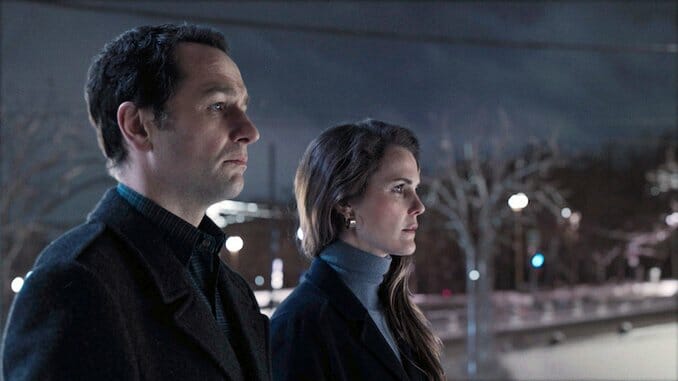On Returning to America with The Americans
The show emits the same simmering foreboding that current living conditions replicate.
Photo Courtesy of FX
On the twelfth of March, I was debating whether or not to return to the United States while living overseas in Great Britain. I sat on my small bed within my closet-sized room where my wardrobe, desk, and bedframe had to be arranged just-so, in order for drawers to slide out, the wardrobe cabinet to swing out, and the door to the room to open and shut all at the same time. Within this space, I had already felt trapped. Peering into the face of my phone, I watched Boris Johnson deliver both a grim and uninformative speech: “We will lose loved ones before their time.” COVID-19 was no longer able to be ignored, and it sought to up the ante of anxiety.
With my push notifications declaring that Trump would impose travel bans, my confusion melted into a dread. Knowing I needed to efficiently book a plane ticket, send in my notice to my employer, and pack up what little I owned, I chose to do none of that. I opened my laptop, searched through my Amazon Prime video saved shows, and clicked on FX’s The Americans.
I descended into The Americans for escapism. I thought it was a flinty spy show. But as I finished the pilot, something glinted beneath the ‘80s camp and espionage. From Keri Russell’s character, Elizabeth Jennings, being introduced in
duplicate—one part reflected in a mirror, the other working her source—The Americans already hinted that it worked best in a state of in between, lurking in dualities. As I abdicated my responsibilities further, watching one, then two more episodes, it became clear: the characters of Phillip (Matthew Rhys) and Elizabeth Jennings straddled multiple realities. Their marriage hinged from real to fake, their national identities swinging from American to Russian, their grasp of self sliding from within their control to scattered among their various aliases. All the real narrative tension simmered from internal, invisible conflict. The threat looms.
To watch The Americans is to witness a masterclass in blistering dread. So while my life skidded out from under me, my residence status hovering like a question mark, I didn’t find what I wanted in The Americans through departure from this world; I found kinship. The show emits the same simmering foreboding that current living conditions replicate. Every small decision to leave your apartment, speak to your neighbor, or water your plants feels critical and fateful. While the series embeds real historical events to build out the plot, the writers predominantly explore the Jennings’ domestic and interpersonal lives as the true cause for worry. What happens if your martial fight catches the attention of your next door neighbor, who happens to be an FBI agent? How do you handle your child blabbing about your spy status to her preacher? Who can you trust?
-

-

-

-

-

-

-

-

-

-

-

-

-

-

-

-

-

-

-

-

-

-

-

-

-

-

-

-

-

-

-

-

-

-

-

-

-

-

-

-








































